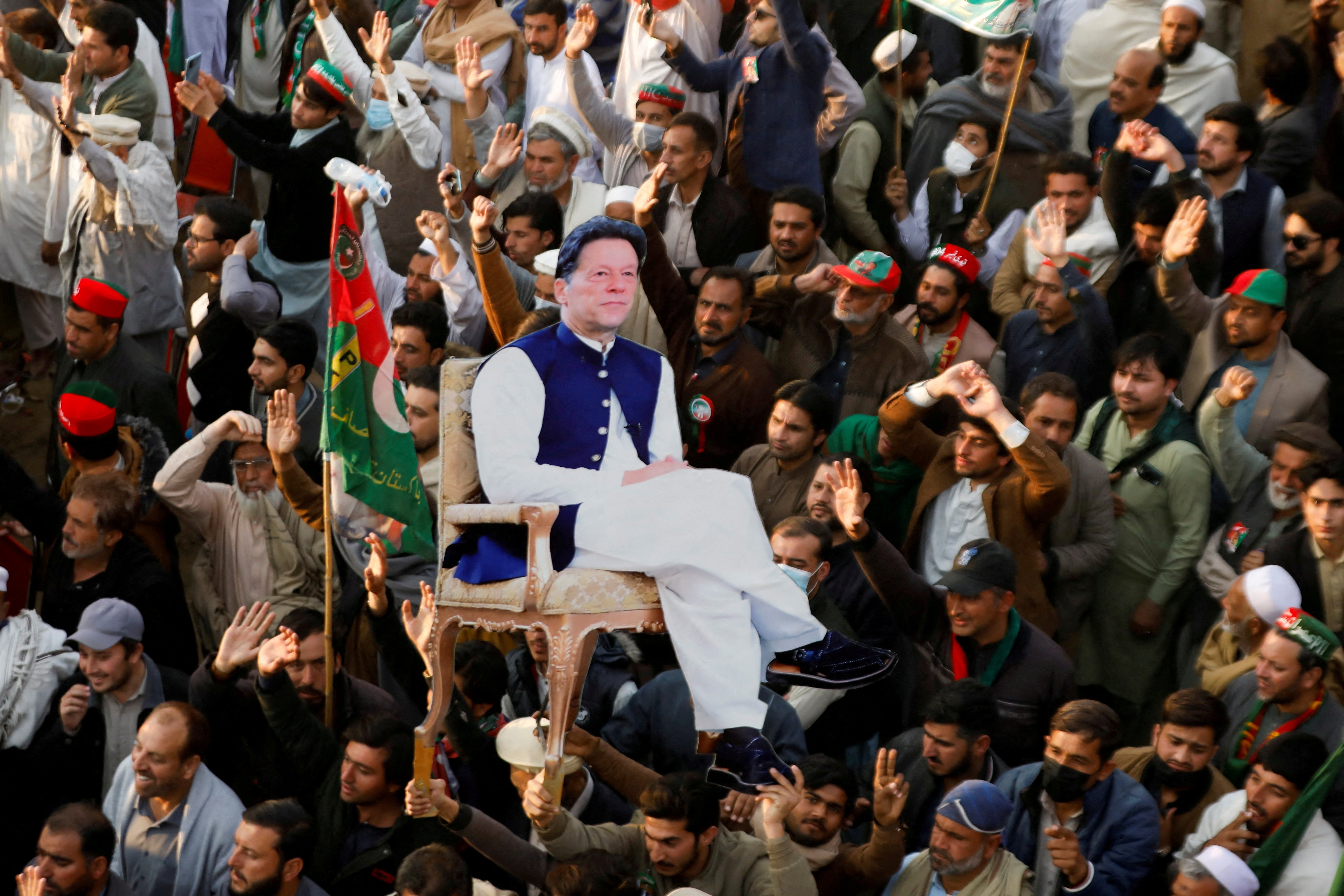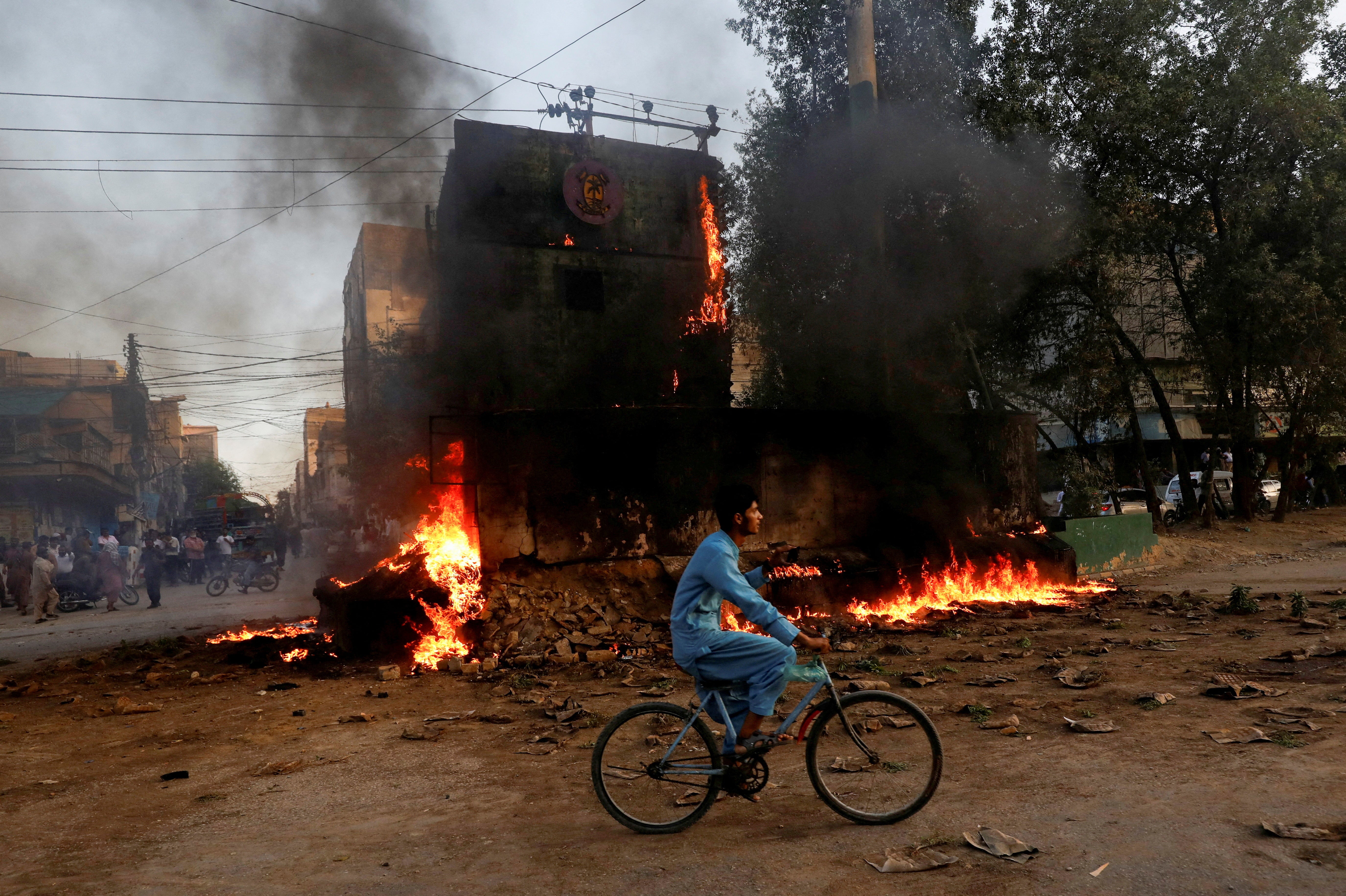As Imran Khan completes two years in jail, his party is preparing to approach the UN with a new case alleging “torture” and “inhumane” treatment of Pakistan’s former prime minister and his wife in custody.
A UN human rights working group last year found the former leader’s incarceration to be arbitrary and unlawful and ruled the “appropriate remedy would be to release Khan immediately and accord him an enforceable right to compensation and other reparations, in accordance with international law”.
Zulfiqar Ali Bukhari, a senior aide to Khan, tells The Independent that their Pakistan Tehreek-e-Insaf party is once again approaching the UN with formal documentation outlining the alleged custodial torture of the former leader and his wife, Bushra Bibi. “We are putting a case,” he says, “it’s going to be lodged very soon.”
The party is also ramping up pressure at home. To mark the second anniversary of Khan’s arrest on 5 August, members and supporters of Pakistan Tehreek-e-Insaf intend to take to the streets, demanding their leader’s release and denouncing what they call a sustained campaign to silence the country’s most popular political figure.
Bukhari says supporters will organise peaceful rallies and neighbourhood meetings and the party will release a “white paper” documenting what it calls years of state repression.
The party aims for the protest to build momentum towards a broader national mobilisation. “There is no choice but to start building momentum for a national protest. We want to start off building momentum,” he says.
Khan was removed as prime minister through a parliamentary no confidence motion in 2022 and arrested over corruption allegations on 9 May 2023.
His arrest sparked nationwide protests, some of which turned violent and targeted military installations.
Khan was released shortly after but jailed again on 5 August 2023, marking the beginning of a series of legal battles.
The jailed leader has accused Pakistan’s powerful military of conspiring with the US to topple him. The military and the US have denied the accusations.
Khan’s party has faced a sustained state crackdown since his ouster. Just last week, a Pakistani court sentenced 108 senior members of the party, including leader of the opposition Omar Ayub Khan, to 10 years in prison for their alleged role in the 2023 anti-government protests sparked by Khan’s arrest.

The ruling was another major setback for the party, which had already lost many of its leaders to arrests or pressure to quit politics.
Pakistan Tehreek-e-Insaf has maintained the 2023 protests were mostly peaceful and reflected public anger against Khan’s arrest. But the government has used antiterrorism laws to crack down on the party’s leadership that it has accused of being involved in the agitation. Critics say the sentencing of over 100 leaders at once shows the state’s aim is to weaken the party.
British Pakistanis (PTI) are protesting outside 10 Downing Street in London, demanding the release of Imran Khan. pic.twitter.com/i8j694waWm
— Ihtisham Ul Haq (@iihtishamm) August 3, 2025
Khan’s lawyers are sounding concern over what they describe as the erosion of judicial independence in Pakistan. Abuzar Salman Niazi, one of the lawyers, claims the courts are being used to sideline the former prime minister through politically motivated convictions and procedural delays.
He also says Khan’s treatment in prison violates both Pakistani law and international human rights standards. “He’s kept in solitary confinement for 22 to 23 hours a day. Even safe drinking water is not provided,” Niazi tells The Independent.
“There is psychological torture that he is being subjected to continuously. His wife is being treated in a very unfair manner.”
According to Khan’s legal team, the judiciary is increasingly aligned with the executive, denying fair trial rights and enabling what they call a systematic effort to crush dissent.

Khan’s party alleges that he and his wife face inhumane treatment in custody, especially during Pakistan’s searing summer. “The last six months, especially the last three to four months, have been excruciatingly hot,” Bukhari says. “They’ve blocked access to him. There’s been a severe lack of communication. His legal team has extremely limited to no access. His calls to his children, some weeks go by where he doesn’t meet anybody.”
#PakWatch🇵🇰: Today's full-page New York Times advertisement contains the full details of PM Imran Khan's illegal detention in solitary confinement.
— Steve Hanke (@steve_hanke) August 3, 2025
FREE CAPTAIN PAKISTAN. pic.twitter.com/vp6KVsBHTF
The Independent sent a list of questions for Khan through a close aide, but they were unable to obtain a response because, they claimed, his lawyers were being denied access to him.
While Pakistan Tehreek-e-Insaf continues to call for mass mobilisation and international intervention to get Khan out, it is grappling with internal challenges as well.
The sweeping state crackdown has not only targeted the party’s leadership but also sparked internal fragmentation. Several prominent figures have either distanced themselves from the party or gone silent under pressure, leaving a vacuum that the party has struggled to fill.
Former Prime Minister Imran Khan’s Important Message from Adiala Jail
— PTI Canada Official (@PTIOfficialCA) August 3, 2025
(August 2, 2025)
"Every Pakistani must become part of the movement for real freedom against the oppressive system imposed on our nation, so that we can truly become a free and sovereign people. If we stand… https://t.co/rQNHYEI7wO
Bukhari acknowledges these challenges. “There’s always going to be issues with leadership when the most popular leader of the largest political party is in prison,” he says. “It’s only natural you’re going to have these problems because the party has always been led by someone who’s a larger-than-life figure, and people have got to know him and got to believe in him and love him. So, no one is going to live up to that. There’re naturally going to be shortfalls all around. The main thing is that, in what you call fragmentation, is that these are problems that will continue until Imran Khan comes out.”
He claims the state has deliberately restricted Khan’s communication with his closest allies to sow confusion and disunity.
“They suffocate our communication with him, which creates different variants of what Imran Khan may have thought or said in prison,” he explains. “That’s very tactfully done.”
As Khan remains effectively cut off from his party and legal battles keep mounting – he still faces over 200 cases – questions loom over what Pakistan Tehreek-e-Insaf looks like without the founder at the helm. In the absence of Khan from day-to-day politics, there is no one to fill the leadership vacuum.
In spite of these challenges, the party insists it is not collapsing. Bukhari says that no leader in “Pakistan’s history” can match Khan’s popularity or charisma, so, instead of trying to replace him, they must focus on keeping the party united.
“It’s not about filling his shoes,” he argues. “It’s about steering the party in a manner that can weather the storm.”
A shocking revelation by Imran Khan’s sisters: Their brother, a former Prime Minister of Pakistan and head of the most popular political party in Pakistan today, already illegally detained, has been deliberately subjected to mental torture, during imprisonment and isolation… pic.twitter.com/FC0yGajvK8
— PTI Canada Official (@PTIOfficialCA) July 26, 2025
Niazi says Khan has endured his physical and emotional torment, including pressure on his family meant to break him, with courage.
“But he’s still standing tall. He’s not giving up. He’s standing for the rule of law. He’s standing tall for democracy,” the lawyer says. “He’s standing tall for an independent judiciary.”
Khan’s imprisonment has become a flashpoint in Pakistan’s ongoing political crisis, raising concerns about the fairness of the justice system and the space for opposition voices. For many, Khan’s time behind bars has only reinforced the image he spent years building – that of a defiant figure weathering the storm.
Still, with Pakistan Tehreek-e-Insaf facing a sweeping crackdown and Khan dealing with his own mounting legal troubles, it’s unclear how long his resilience alone can sustain a party under siege.
India calls Trump’s tariff threat over Russian oil purchases ‘unjustified’
Cambodia to nominate Donald Trump for Nobel Peace Prize after border truce
How do Trump’s tariffs affect Asian countries?
Thousands to rally in Bangladesh one year after Sheikh Hasina’s fall
Mystery of country’s most expensive airport that has no planes or passengers
Pakistan jails more leaders from Imran Khan’s party on ‘terrorism’ charges







